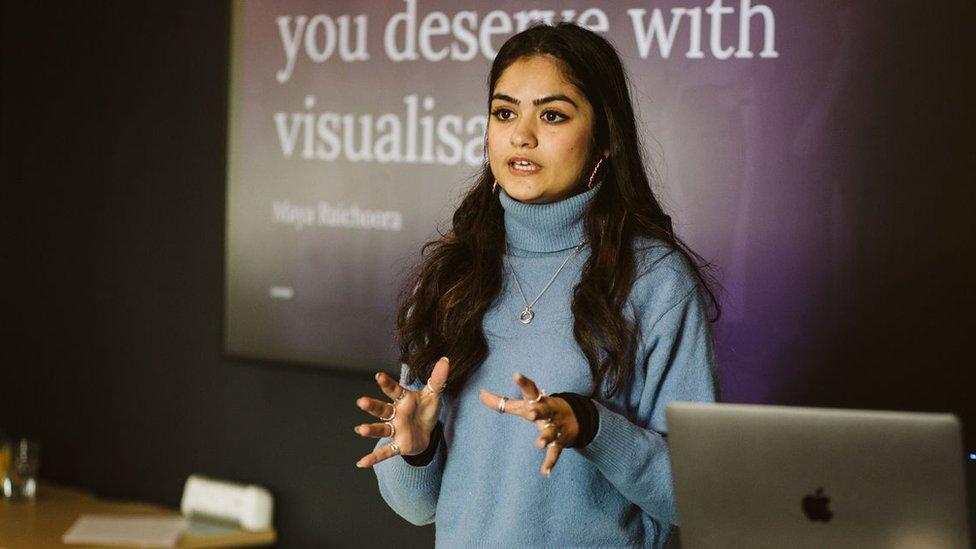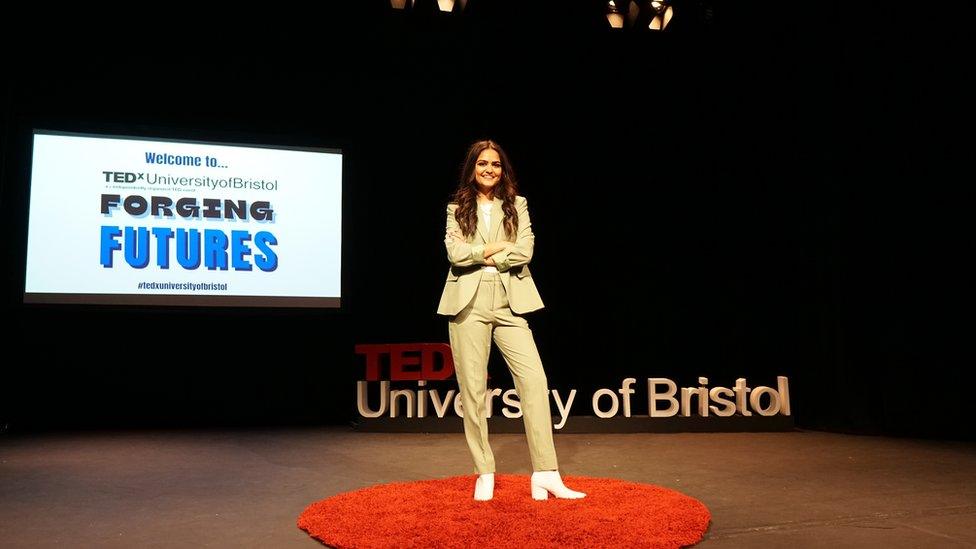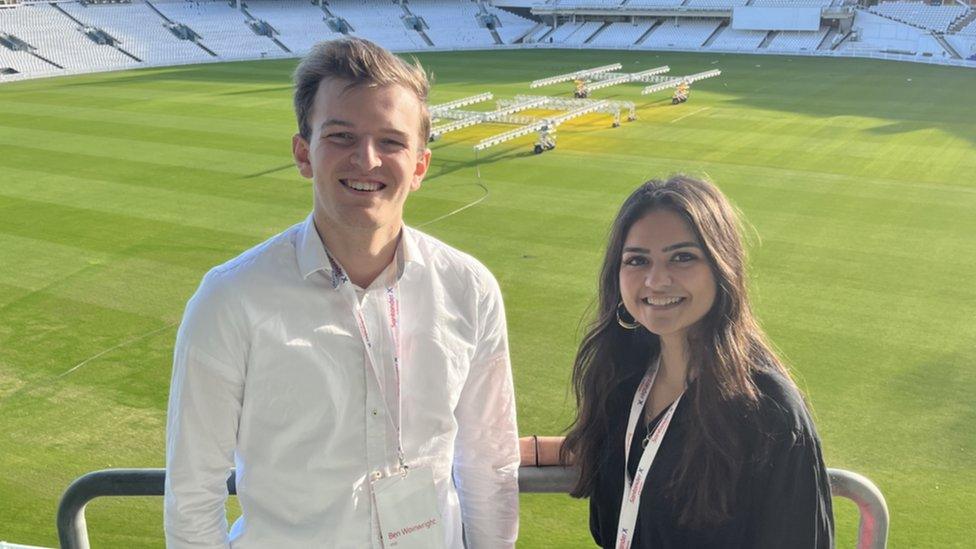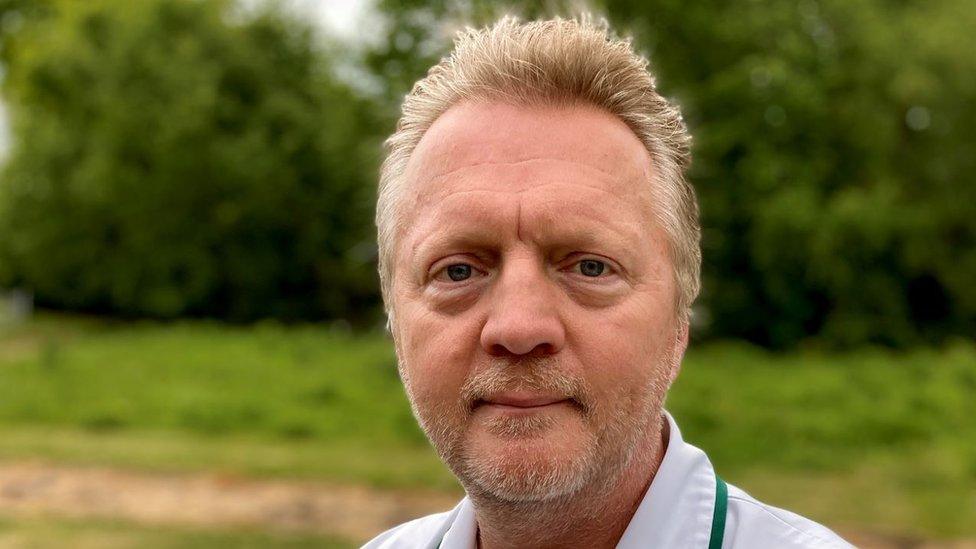Woman says visualisation helped pain battle
- Published

Maya Raichoora says ulcerative colitis left her taking a lot of medication each day but visualisation techniques have left her not needing medication
A woman who had debilitating pain as a teenager credits visualisation techniques with saving her life.
Ulcerative colitis used to leave Maya Raichoora taking 65 pills a day and in "constant agony".
She said visualisation techniques helped her and now she has co-founded a start-up, Remap, which aims to help others.
"It's been life-saving and life-changing, I just wouldn't be here if it wasn't for visualisation," she said.
The 24-year-old said visualisation is like "weightlifting for the brain" and can improve how people "think, feel and perform".
She and co-founder Ben Wainwright started crafting Remap while they were studying at the University of Bristol's Centre for Innovation and Entrepreneurship.
'Too painful'
Miss Raichoora said: "I was told by many people that my life - the life that I knew - was over; that I'd need 24/7 care for the rest of my life, surgery, all those kinds of things.
"The pain was constant and inhuman. Even the highest levels of morphine weren't doing anything. Sometimes it was too painful to cry.
"I still remember the day they said I wouldn't go to uni, that I physically couldn't. It was a lot for a 15-year-old."
Dr Robert Drake, is a research fellow at Bristol University School of Physiology, Pharmacology and Neuroscience.
He said: "Visualisations likely offer a feeling of control in what presumably feels an uncontrollable situation and we know from fundamental research that perceived control facilitates successful coping and better heath."

Maya Raichoora uses visualisation techniques every day
Ms Raichoora was in yet another hospital bed - unable to walk for two weeks from the pain - when she started visualising.
She began small, imagining what it would feel like to walk again.
She said the mental images gave her a flash of hope - but it would take a few days of visualisation before she finally made her first tottering steps.
"I just thought 'oh my god'," she said. "I kept doing it from then on. I would visualise going home, seeing my dog, going to Bristol University. It slowly gave me the motivation and strength to keep going.
"Nine years on, having consulted with medical professionals, I no longer take any medication," she said.
Ms Raichoora spends an hour visualising and an hour meditating every day. The visualisations vary, but can include the future she wants, a positive outcome to a pitch meeting or simply images that evoke positive feelings.
'Tune down pain'
Dr Drake said that positive imagery would improve mood and motivation, as well as engaging "pain modulatory systems to tune down pain in anticipation of painful movement".
Dr Drake explained that techniques which increase a persons internal awareness and sensations have been show to "provide therapeutic benefits" across a variety of pain, mood and psychiatric disorders.
He added: "The interaction between thoughts or beliefs with sensory processing is inherently difficult to study, whether in animals or humans, and therefore we currently lack the mechanistic neurophysiological understanding to make a clear case to the public who are, naturally, a little sceptical.
"However, we are starting to see a shift in the advice from specialist clinicians and the NHS that improving lived experience of pain through wellbeing, therapy etc provides good outcomes for patients, often better than those provided by current medication."

Ben Wainwright and Maya Raichoora set up Remap to help others through visualisation techniques
Both the co-founders continue to be mentored by University of Bristol's Centre for Innovation and Entrepreneurship staff and recently won funding from the university's start-up competition.
Mr Wainwright, 23, who struggled with anxiety during his school years, said: "Just as people train their bodies to reach their aspirations, they can also train their minds.
"Much of my anxiety was brought on by my own mind. It was a big moment for me to realise that if my mind was causing it, it could stop it too."
"We envision a world where mental fitness is as common as physical fitness."

Follow BBC West on Facebook, external, Twitter, external and Instagram, external. Send your story ideas to: bristol@bbc.co.uk , external
- Published17 May 2022
